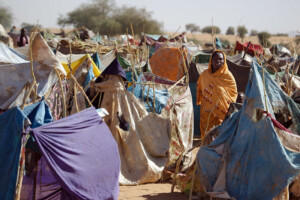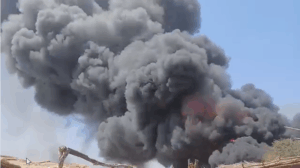Sudan coup: Detentions continue, internet remains closed
Sudan remains in the grip of the military who took over power in a coup on Monday. Detentions are continuing, while steering bodies of government and non-government institutions have been dissolved. Flights at the Khartoum International Airport reportedly resumed on Wednesday.
 Khartoum International Airport (Social media)
Khartoum International Airport (Social media)
Sudan remains in the grip of the military who took over power in a coup on Monday. Detentions are continuing, while steering bodies of government and non-government institutions have been dissolved. Flights at the Khartoum International Airport reportedly resumed on Wednesday.
Most bridges in Khartoum remained closed, and streets remained empty, except for military vehicles and groups of protesters blocking main streets. The protests grew into demonstrations in the evening.
Lt Gen Abdelfattah El Burhan announced on Tuesday that all steering boards and committees in government institutions, unions, professional associations, as well as the employers’ union have been dissolved.
On Tuesday as well, the Civil Aviation Authority issued a circular suspending all incoming and outgoing flights at Khartoum International Airport until October 30. But later that day, they announced that flights would resume on Wednesday afternoon.
On Tuesday afternoon, the authorities partially restored telecommunications and the internet, after an outage of more than 30 hours. The network was quickly overstressed. Those who managed to connect to the internet, could see a large number of video clips posted of the street protests that erupted on Monday following the coup. A large number of state governors condemned the coup on their Facebook pages.
Yesterday, the internet services were blocked again. The Office for the Coordination of Humanitarian Affairs (OCHA) in Sudan reported this morning that internet provider Zain is working sporadically. “This is affecting the operations of humanitarian organisations, with staff implementing alternative work modalities (where internet allows), and critical staff are working in their offices,” the UN agency stated.
Detentions continue
The military and security forces continued their massive campaign of detentions against political leaders, journalists, and activists, while Prime Minister Hamdok was reportedly returned to his home on Tuesday.
He was held on Monday morning, allegedly after he refused to issue a statement in support of the coup, and moved to an unknown location.
On Monday evening, Siddig El Sadig El Mahdi, a leading member of the National Umma Party, and Ismail El Taj of the Sudanese Professionals Association were detained.
Sources reported as well that Sovereignty Council member Mohamed El Taayshi and members of his office were held on Tuesday, following statements he made against the coup. On Wednesday, Minister of Health Omar El Najeeb, Minister of Irrigation and Water Resources Yasir Abbas, and Advisor to the Prime Minister, Hasan Nasrallah were detained following their return from Port Sudan.
Military forces are reported to have been going house to house in Khartoum detaining activists and protest organisers. The Sudanese Teachers Committee announced the detention of its president, Yasin Hasan Abdelkarim, on Tuesday.
The authorities also held journalist Fayez El Seleik and Sudan TV staff member Maher Abuljoukh.
In a statement on Wednesday, the Sudanese Journalists Network condemned the closing of telecommunications and the internet, “that prevent the people from their right to freely exchange information”.
The network also condemned “the continued targeting of journalists and preventing them from carrying out their duty to cover and obtain information”, and the detention of El Seleik and Abuljoukh, “in a way that recalls the practices of the former regime in dealing with journalists”.
According to the network, the cutting off of the telecommunications and the internet “enables the militiamen behind the coup regime, its security apparatus and its shadow brigades, to commit even more crimes against the Sudanese and the forces of the revolution, and to hide the evidence that proves their involvement in mass attacks like the massacre of the [June 3, 2019] sit-in”.











 and then
and then